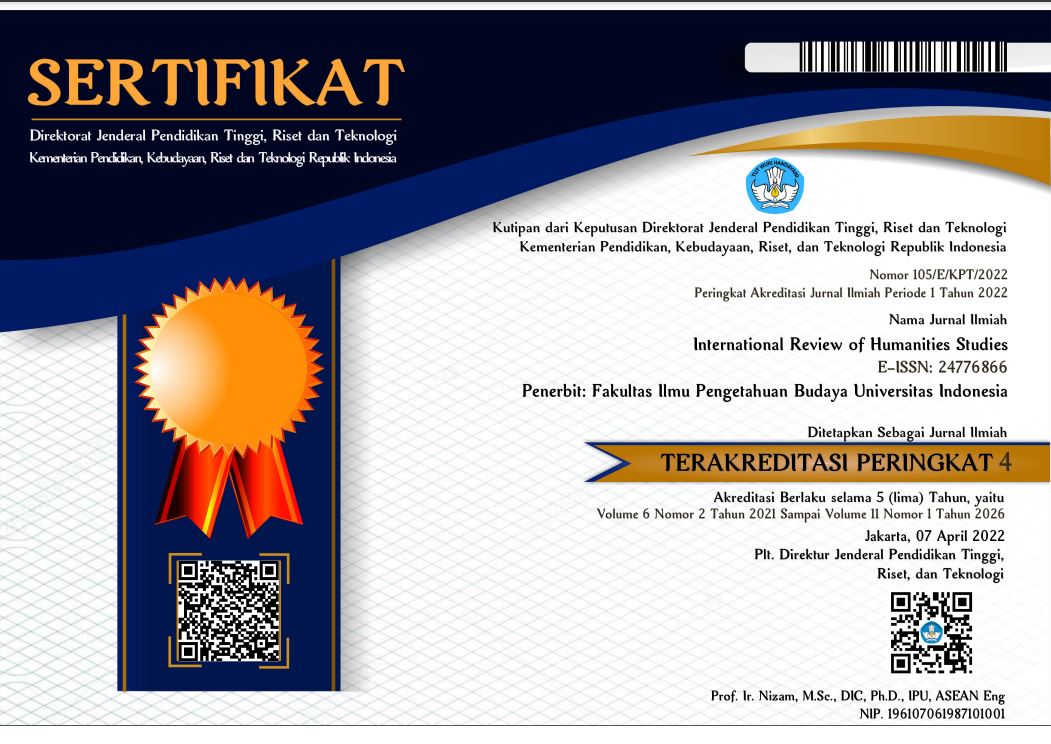International Review of Humanities Studies

Abstract
China's cultural diplomacy utilizes a range of strategies, including cultural exchange programs, media outreach, and people-to-people interactions, to further its national interests and enhance its international image. The primary aims are to foster a positive perception of China, build mutual understanding and trust with other nations, and expand China's cultural and economic influence. The overseas Chinese community in Southeast Asia has been recognized as a crucial conduit for advancing Chinese cultural policy globally. Recently, the Chinese government has conducted official visits to the Baba & Nyonya Heritage Museum in Malacca, Malaysia, exemplifying its efforts to engage with the local community. This research article explores China's engagement with Southeast Asia through cultural heritage, with a particular focus on the Peranakan community in Malaysia as a case study.
References
Anchimbe, Eric A. Linguistic Identity in Postcolonial Multilingual Spaces. Newcastle: Cambridge Scholars Publishing, 2007.
Bound, K., Briggs, R., Holden, J., and Jones, S. Cultural Diplomacy. Leicester: Iprint, 2007.
Clammer, John R. Straits Chinese Society: Studies in the Sociology of the Baba Communities of Malaysia and Singapore. Singapore: Singapore University Press, 1980.
Cobuild, C. Advanced Learner’s English Dictionary. Beijing: Foreign Language Teaching and Research Press, 2006.
Cummings, M. Cultural Diplomacy and the United States Government: A Survey. Washington, D.C.: Centre for Arts and Culture, 2003.
Kittisak Prasertsuk. Soft Power: China, Japan, Korea in ASEAN and Implications for Thailand. Office of the National Science and Technology Development Agency, 2023.
Ma, Hui. “The Comparative Study of U.S.-China Soft Power Diplomacy to ASEAN.” PhD diss., Chulalongkorn University, 2021. https://digital.car.chula.ac.th/chulaetd/7727.
Mirza, H. S. Black British Feminism: A Reader. London and New York: Routledge, 1997.
Nye, Joseph S., Jr. Soft Power: The Means to Success in World Politics. New York: Public Affairs, 2004.
Ptáčková, Jarmila, Ondřej Klimeš, Gary Rawnsley, and Jens Damm, eds. Introduction: The Soft Edges of China’s Hard Power. In Transnational Sites of China’s Cultural Diplomacy. Singapore: Palgrave Macmillan, 2021.
Suryadinata, Leo, ed. Peranakan Chinese in a Globalizing Southeast Asia. Singapore: Chinese Heritage Centre, 2010.
Tan, Chee Beng. The Baba of Melaka: Culture and Identity of a Chinese Peranakan Community in Malaysia. Petaling Jaya: Pelanduk Publications, 1988.
Teo, Kok Seong. The Peranakan Chinese of Kelantan: A Study of the Culture, Language and Communication of an Assimilated Group in Malaysia. London: ASEAN Academic Press Ltd, 2003.
Vaughan, J. D. The Manners and Customs of the Chinese of the Straits Settlements. Kuala Lumpur: Oxford University Press, 1977.
Vaughan, J. D. The Manners and Customs of the Chinese of the Straits Settlements. Kuala Lumpur: Oxford University Press, 2007.
Wang, Gungwu. “The Peranakan Phenomenon: Pre-national, Marginal and Transnational.” In Peranakan Chinese in a Globalizing Southeast Asia, 14–26. Singapore: Chinese Heritage Centre, 2010.
Hoon, Chang Yu. “Continuity and Change: The Dynamics of Chineseness in Indonesia.” Southeast Asia: A Multidisciplinary Journal 19 (2019): 1–13.
Jannarongsor, Panupong, and Suppakorn Khonkhlong. The Role of the Overseas Chinese Communities in Northern Thailand as Soft Power under China’s Belt and Road Initiative. 2022.
Lee, Yuen Thien. Identity Maintenance and Identity Shift: The Malacca Baba and Nyonya Community. University Kebangsaan Malaysia, 2016.
Tan, Y. S., and Ngah, K. “Identity Maintenance and Identity Shift: The Case of Tirok Chinese Peranakan in Terengganu.” Asian Ethnicity 14, no. 1 (2013): 52–79.
Fang, Zhongfu, and Li, Erhe. Peace Missions on a Grand Scale – Admiral Zheng He’s Seven Expeditions to the Western Oceans. Beijing: Foreign Languages Press, 2005.
Kittisak Prasertsuk. Soft Power: China, Japan, Korea in ASEAN and Implications for Thailand. Office of the National Science and Technology Development Agency, 2023.
Ma, Hui. “The Comparative Study of U.S.-China Soft Power Diplomacy to ASEAN.” PhD diss., Chulalongkorn University, 2021. https://digital.car.chula.ac.th/chulaetd/7727.
NST Team. “Chinese Premier Li Visits Historic Malacca.” New Straits Times, 2015. https://www.nst.com.my/news/2015/11/113201/chinese-premier-li-visits-historic-malacca.
Zhang, Guozuo. “新时代中国文化软实力具有独特优势.” China Communist Party News. September 16, 2024. http://theory.people.com.cn/n1/2021/1015/c40531-32254293.html.
Yan, Xiaoxiao. “应对《中国锐实力说》:文化外交视角下中国的软实力运用与国际形象塑造.” Journal of Central South University (Social Sciences) 26, no. 5 (September 2020).
中共中央办公厅 国务院办公厅印发《‘十四五’文化发展规划》. 中华人民共和国中央人民政府. March 25, 2023. http://www.gov.cn/zhengce/2022-08/16/content_5705612.htm.
Kornphetcharat, K. The Rise of the Chinese Community before Railways: The Impact of International Politics towards the Chinese Community Establishment in Ubon Ratchathani. 2023.
Recommended Citation
Kornphetcharat, Kotchaphop and Thien, Lee Yuen
(2025)
"CHINA'S CULTURAL DIPLOMACY AND ITS ENGAGEMENT WITH THE PERANAKAN COMMUNITY IN MALACCA,"
International Review of Humanities Studies: Vol. 10:
No.
1, Article 17.
DOI: 10.7454/irhs.v10i1.1348
Available at:
https://scholarhub.ui.ac.id/irhs/vol10/iss1/17
Included in
Anthropology Commons, Art and Design Commons, Creative Writing Commons, Cultural Heritage Law Commons, Education Law Commons, Film and Media Studies Commons, History Commons, Intellectual Property Law Commons, International and Area Studies Commons, Legal Writing and Research Commons, Linguistics Commons, Museum Studies Commons, Philosophy Commons, Urban Studies and Planning Commons


